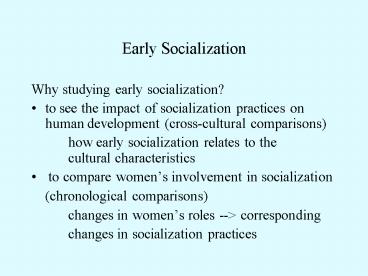Early Socialization - PowerPoint PPT Presentation
1 / 9
Title:
Early Socialization
Description:
7 years (girls) 12-18 years (boys) genpuku initiation into manhood ... Developing Japanese ways of communication. Omoiyari training (mother-- child) ... – PowerPoint PPT presentation
Number of Views:101
Avg rating:3.0/5.0
Title: Early Socialization
1
Early Socialization
- Why studying early socialization?
- to see the impact of socialization practices on
human development (cross-cultural comparisons) - how early socialization relates to the
cultural characteristics - to compare womens involvement in socialization
- (chronological comparisons)
- changes in womens roles -- corresponding
- changes in socialization practices
2
Developmental milestones
- 7 days after birth name-giving ceremony
- About one month o-miyamairi family shrine
- 100-120 days kuizome first solid food
- 3 years (girls) shichi-go-san shrine
- 5 years (boys)
- 7 years (girls)
- 12-18 years (boys) genpuku initiation into
manhood - (girls) kanetsuke initiation into
womanhood - 20 years seijin-shiki
- March 3 hina-matsuri dolls festival
- May 5 kodomo-no-hi boys festival
3
Developmental milestones7-5-3
4
Early SocializationCharacteristics
- Physical closeness
- sleeping pattern
- methods of carrying babies
- notion of using baby-sitters
- Perceptions of good mother -- omoiyari
- Measuring mothers commitments
5
Early SocializationDevelopmental consequences
- Intense mother-child interaction
- Internal family relationships (Vogel, 1963
Bestor (1983) - Japan US
- Mother-Child Husband-Wife
- Father Child
6
Socialization goals
- Befu (1986)
- Japan US
- Inter-individualism Individualism
- Particularism
- Mutuality of trust
- Role perfection
7
Developing Japanese ways of communication
- Japanese (omoiyari-based) communication style
- (Clancy, 1986, 1991)
- Context dependent
- Indirect
- Rich in connotation
- Evasive in denotation
8
Developing Japanese ways of communication
- Omoiyari training (mother-- child)
- Strategies to communicate the importance of
- being sensitive to other peoples wishes
- Telling the child directly what other people are
thinking and feeling - Telling the child to do what other people want
him/her to do before being told
9
Developing Japanese ways of behavior
- Conformity training
- Formulaic expressions at home/pre-school itadakima
su before eating - gochisosama after eating
- Fear of being different
- Discouraging undesirable behaviors
- English-speaking vs. Japanese mothers































